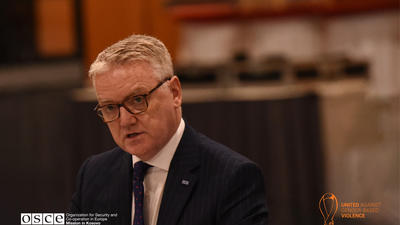-
Our work
-
Fields of work
- Arms control
- Border management
- Combating trafficking in human beings
- Conflict prevention and resolution
- Countering terrorism
- Cyber/ICT Security
- Democratization
- Economic activities
- Education
- Elections
- Environmental activities
- Gender equality
- Good governance
- Human rights
- Media freedom and development
- Migration
- National minority issues
- Policing
- Reform and co-operation in the security sector
- Roma and Sinti
- Rule of law
- Tolerance and non-discrimination
- Youth
- Field operations
- Projects
-
Meetings and conferences
- Summit meetings
- Review Conferences
- Ministerial Council meetings
- Plenary meetings of the Permanent Council
- Plenary Meetings of the Forum for Security Co-operation
- Security Review Conferences
- Annual Implementation Assessment Meetings
- Economic and Environmental Forum
- Economic and Environmental Dimension Implementation Meetings
- Human rights meetings
- Media conferences
- Cyber/ICT security conferences
- Conference of the Alliance against Trafficking in Persons
- Gender equality conferences
- Annual OSCE Mediterranean conferences
- Annual OSCE Asian conferences
- Partnerships
-
Fields of work
-
Countries
- All
-
Participating States
- Albania
- Andorra
- Armenia
- Austria
- Azerbaijan
- Belgium
- Belarus
- Bosnia and Herzegovina
- Bulgaria
- Canada
- Croatia
- Cyprus
- Czechia
- Denmark
- Estonia
- Finland
- France
- Georgia
- Germany
- Greece
- Holy See
- Hungary
- Iceland
- Ireland
- Italy
- Kazakhstan
- Kyrgyzstan
- Latvia
- Liechtenstein
- Lithuania
- Luxembourg
- Malta
- Moldova
- Monaco
- Mongolia
- Montenegro
- The Netherlands
- North Macedonia
- Norway
- Poland
- Portugal
- Romania
- Russian Federation
- San Marino
- Serbia
- Slovakia
- Slovenia
- Spain
- Sweden
- Switzerland – OSCE Chairpersonship 2026
- Tajikistan
- Türkiye
- Turkmenistan
- Ukraine
- United Kingdom
- United States of America
- Uzbekistan
- Asian Partners for Co-operation
- Mediterranean Partners for Co-operation
-
Structures and institutions
- Chairpersonship
-
Secretariat
- Secretary General
- Office of the Secretary General
- Conflict Prevention Centre
- Transnational Threats Department
- Office of the Special Representative and Co-ordinator for Combating Trafficking in Human Beings
- Office of the Co-ordinator of OSCE Economic and Environmental Activities
- Gender Issues Programme
- Opportunities for Youth
- Department of Human Resources
- Department of Management and Finance
- Office of Internal Oversight
- Documentation Centre in Prague
- Institutions
-
Field operations
- Presence in Albania
- Centre in Ashgabat
- Programme Office in Astana
- Programme Office in Bishkek
- Mission to Bosnia and Herzegovina
- Programme Office in Dushanbe
- Mission in Kosovo
- Mission to Moldova
- Mission to Montenegro
- Mission to Serbia
- Mission to Skopje
- Project Co-ordinator in Uzbekistan
- Closed field activities
- Parliamentary Assembly
- Court of Conciliation and Arbitration
- Organizational structure
- About us

Story
Violence against women cannot be justified and must be punished
- Date:
- Source:
- OSCE Secretariat
- Fields of work:
- Gender equality
8 March – International Women’s Day – is an opportunity to reflect on progress, to call for change, and to commemorate acts of courage and determination by women who have made a difference in their communities and countries.
Yet violence against women remains one of the most widespread and persistent human rights abuses in the world, stemming from deep-rooted notions of women’s unequal status. As well as the deep suffering and harm caused to victims, violence against women leads to severe disruption to families, communities and societies, therefore harming far more than the immediate victims.
Violence against women is no longer viewed as an inevitable part of family life, of social relations, of the workplace or of war. Violence against women cannot be justified under any circumstances and must be punished.
There is nothing masculine about violence against women and girls. Men and boys - as partners and supporters - have a key responsibility and a crucial role to play as agents of social and cultural change. Let's all speak out against violence against women and girls.
Auðunn Atlason, Iceland’s Ambassador to the OSCE and the Chair of the OSCE MenEngage Network
The OSCE works with local initiatives and governments to improve opportunities for women in all our societies. In the videos below, learn about our work in Kyrgyzstan and Serbia on how we are working to empower vulnerable women.
Early marriage and human rights
Arranged marriages are still a reality for many young women in Kyrgyzstan. Large numbers of these marriages fall apart and women are often left alone, struggling to get by. The OSCE supports local organizations, including a network of Women’s Initiative Groups, which provide help and assistance for these women.
Support for victims of domestic violence
Women who are victims of domestic violence often do not know where to seek help. The OSCE Mission to Serbia supports Impuls, an organization based in Tutin, which works on the development of a free and open society, achieving equality between men and women in all spheres of private and public life and on the prevention and countering of all forms of violence and discrimination.
OSCE Impact
Discover more stories about how the OSCE improves lives.

